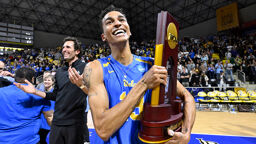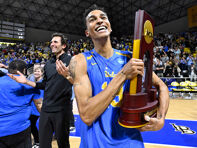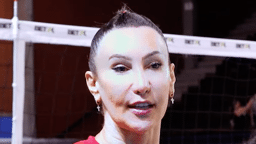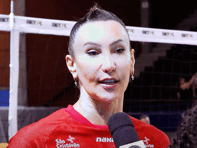In the discussion and debate over the ways and means to include transgender people in sports, voices like Nadia Jacobson’s need to be heard.
In years past, the 37-year-old club volleyball player was part of a men’s team striving to reach the higher-tiers of her nation’s volleyball pyramid. While feeling at home on the court, she felt out of step and out of place with herself.
“Volleyball was an escape from all my thoughts about my identity and my gender,” she said during an interview this week on The Trans Sporter Room podcast. “Even as I played on the court there still was this thing in the back of my head to where I couldn’t commit to it one-hundred percent.
“If I hadn’t been able to play volleyball all these years I wouldn’t be here today. The only highlight of my life all those years was playing volleyball. It was the only thing that kept me going.”

Jacobsen was among many transgender, non-binary and intersex people who told their stories to officials of the Danish Sports Confederation. The governing body spent 2021 working to revamp transgender inclusion policies across the nation’s sports leagues and clubs.
The results led to a report published two weeks ago, which called for changes similar to the sweeping new guidelines of the International Olympic Committee. Those are set to go into effect in March.
The effort ran into resistance by the usual suspects. Mass media in the country has been influenced to indifference or ignorance by online-powered anti-trans pressure groups.
The tactics mimic well-known anti-trans efforts in the U.S. and U.K., and drew the curiosity of one observer, cybersecurity consultant Maia Kahlke Lorentzen.
“It’s the relentlessness, the lack of other things of their lives and they just keep coming at you,” she said. “They don’t have any qualms about bullying and at the same time they talk about being feminists. As a feminist, one should be an accomplice or an ally.”

Lorentzen, a host of a popular podcast on issues of cybersecurity, internet literacy and digital self-defense, turned a scholarly curiosity into a special series on the online radicalization of transphobia. Much of the material has come from her own experience studying hate groups online and stories of individual trans people in her country like Jacobsen’s, who came out three years ago.
When Jacobsen came out, she was immersed into an online inferno of transphobic tweets, memes, and comment sections.
“Online, especially on Facebook and Twitter, it’s insane the number people who comment and call us men and say we have an unfair advantage,” Jacobsen said. “And you have the Danish media who beginning to mimic the English press and they are awful.”
Denmark’s television networks and newspapers have picked up some of the stories on the continuing trans inclusion debate in the U.S. Lorentzen paid particular attention to a news item by the Denmark’s public broadcaster last August on the now-dismissed lawsuit against Connecticut’s department of education and the state’s high school athletics governing body backed by the anti-trans Alliance Defending Freedom.
“Their sports coverage of trans issues is extremely transphobic,” Lorentzen said. “People don’t realize why the article are people, and people are not aware of how steep them are in transphobia.”

Lorentzen hopes her series can help educate and balance the transphobia that seems to be a dominant theme in Danish media. Jacobsen seeks to be the person she needed when she was younger with an ambition to mentor trans youth.
She’s had a positive recent experience to draw on. After coming out three years ago, endless misgendering forced her to leave her longtime club. A second act was stymied by trying to find a women’s team, but there wasn’t enough women available in her area to form a team.

She ended up on a co-ed team. The squad built a bond that led to playing at EuroGames 2021 in Copenhagen last August. The experience was not only affirming for Jacobsen, it was successful. Her team ended up with a gold medal effort in their division.
It was the perfect climax for someone who thought at one time that the game they loved would have to be left behind.
“It was amazing to just be a part of a team again,” she said. “It was something I missed since coming out. It was amazing and we have the gold medal.”
Nadia Jacobsen had much more to say at the intersection of her transition and playing winning volleyball. Maia Kahlke Lorentzen talking about not just facing the anti-trans trolls, but also fighting them. Hear the complete interview in the latest edition of The Trans Sporter Room. Check it out on Megaphone, Spotify, Google Podcasts, Apple podcasts, and many other platforms for Outsports podcasts as well.







































